Organization Overview
- The organization was founded on the state initiative in 2003 (Telecommunications Regulatory Authority, 2019).
- The desire to promote the telecommunications sector in the UAE (Telecommunications Regulatory Authority, 2019).
- Modernizing the current digital database of the state.
- Adhering to the national excellence development plan (“Guideline,” 2017).
- Promoting the electronic government environment in the country.
- Improving all telecommunications areas based on modern technologies.
The Telecommunications Regulatory Authority company (TRA) has set itself quite clear and ambitious goals. Based on the assessment of its activities, the corporation seeks to improve the existing digital base in the UAE and give its residents an opportunity to use modern developments in the field of communications. One of the TRA’s strategies is following “the framework of Abu Dhabi Plan” that involves transforming the sector in question based on the digitalization of its services (“Guideline,” 2017, p. 11).
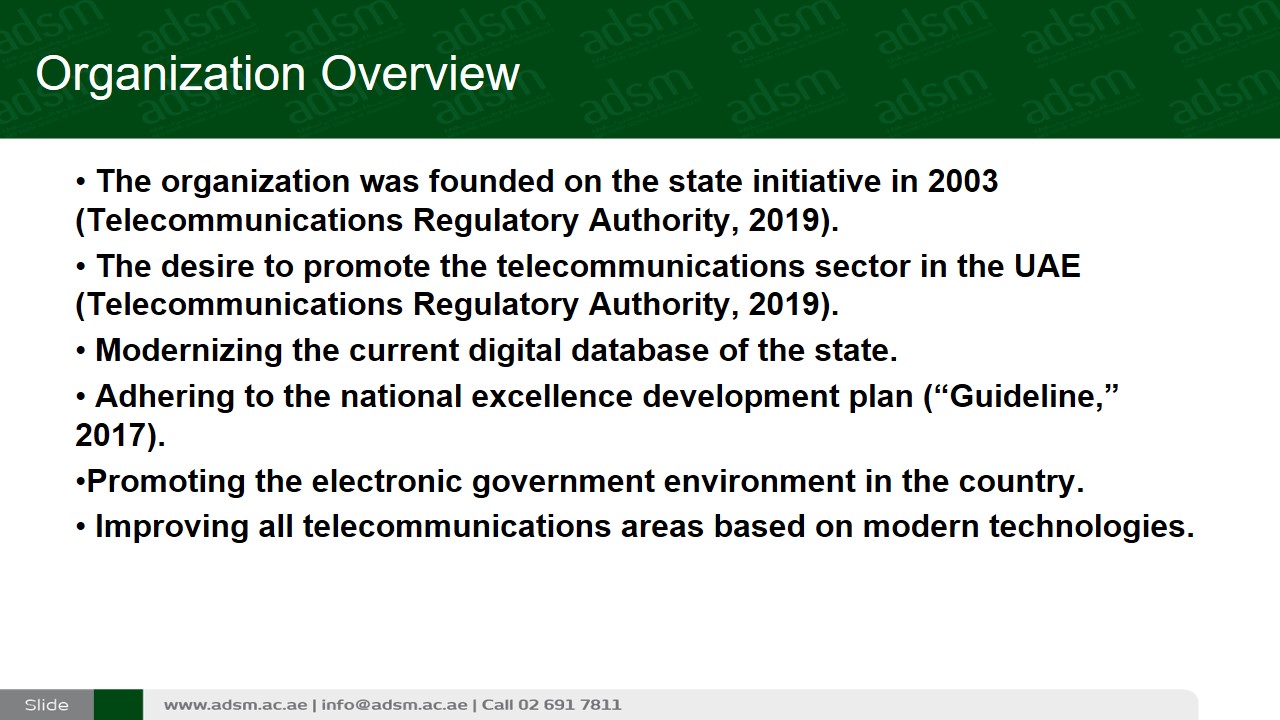
Assessment Process
- Several important criteria are required to evaluate the company’s performance.
- Team dynamics is promoted by the leadership of the organization.
- The assessment includes preparing an analysis plan and interaction with the staff.
- Scoring implies assessing the results obtained based on the research
- To achieve consensus, both subjective and official data will be used.
The process of evaluating the activities of the organization in question is based on applying a number of valuable criteria. Such parameters will be involved as leadership, strategic plans, partnership and resources, products and services, as well as customer, people, society, and key results. Utilizing the practice of interaction with the employees of the company may allow determining the primary forces of TRA’s activity and its significant achievements over the whole period of work in the UAE’s market.
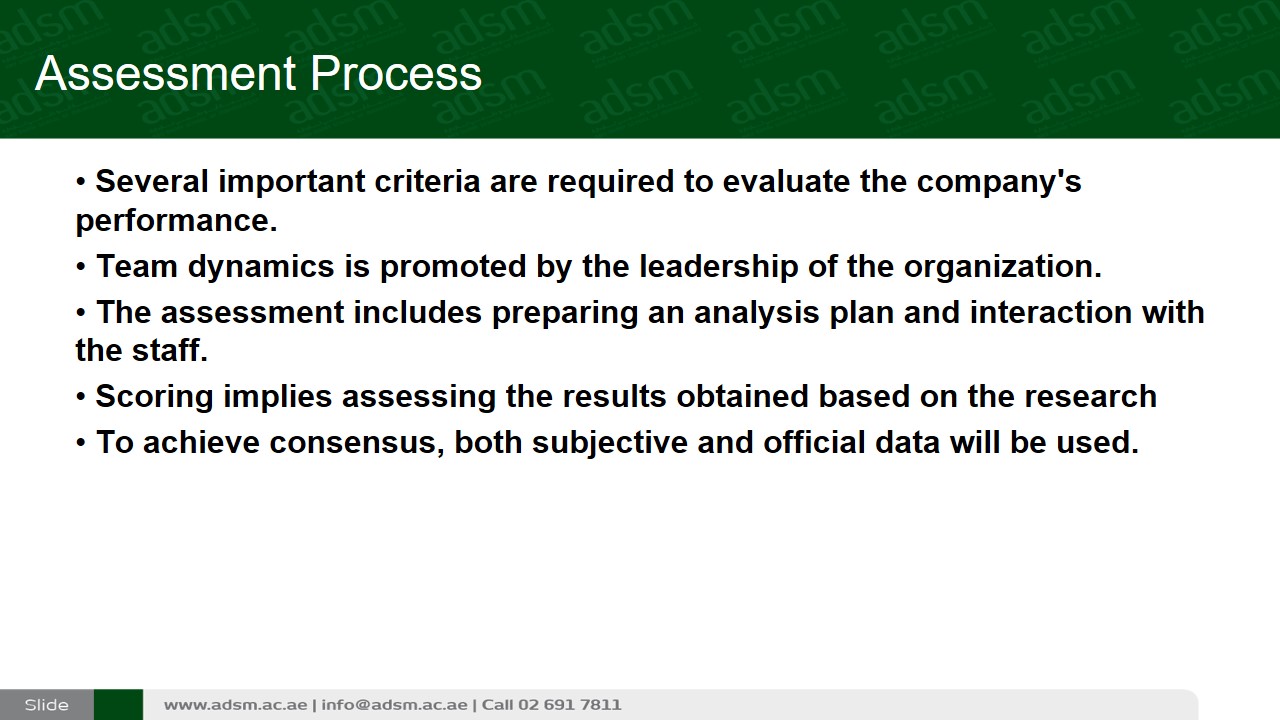
Assessment Findings (Strengths)
- Telecommunications as the key area are developed successfully.
- Implementing the fastest promotion plan (ElSherif, Alomari, & Alkatheeri, 2016).
- Introducing the Smart Pass program (Telecommunications Regulatory Authority, 2019).
- Gradual equipping all branches of life with digital innovations.
- Cooperation with two large telecommunication companies (Yaghi & Al-Jenaibi, 2017).
- Interaction with the government for creating a unified working system.
TRA’s strategic work involves interacting with some of the major participants in the country’s digital market and cooperating with the authorities, which is aimed at promoting relevant innovations. The gradual introduction of new features is the corporation’s official plan. Individual programs, for instance, the Smart Pass, suggest a transition to the new principles of regulating all public spheres. Engaging the latest developments in the field of telecommunications ensures work in a stable and productive environment.
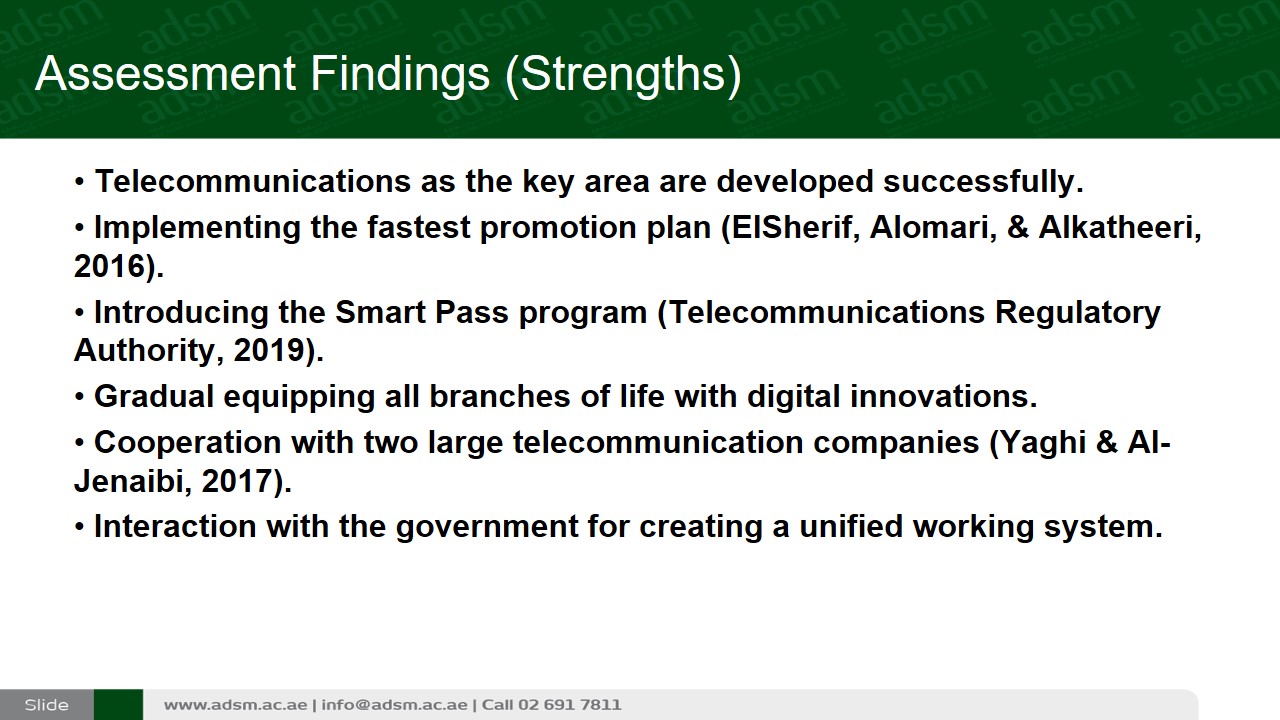
Assessment Findings (Areas for Improvements)
- Using mobile technology for all types of services.
- Strengthening staff retention policies and promotion incentive systems.
- The wider involvement of the population in the discussion of upcoming changes.
- Social activities aimed at promoting the products created.
- Consumer protection and ensuring an effective interaction program.
- Work on products complying with the current digital trends.
Despite the success of TRA in the UAE market, some areas of the organization’s activities can be improved to increase productivity and consumer acceptance. In particular, career guidance work with the staff is essential in order to retain highly qualified specialists. Also, according to Alqudah (2018), mobile technologies should be implemented in all spheres without exception, which is TRA’s omission. Social activities aimed at promoting products and consulting with the public on possible innovations can also be a valuable practice.
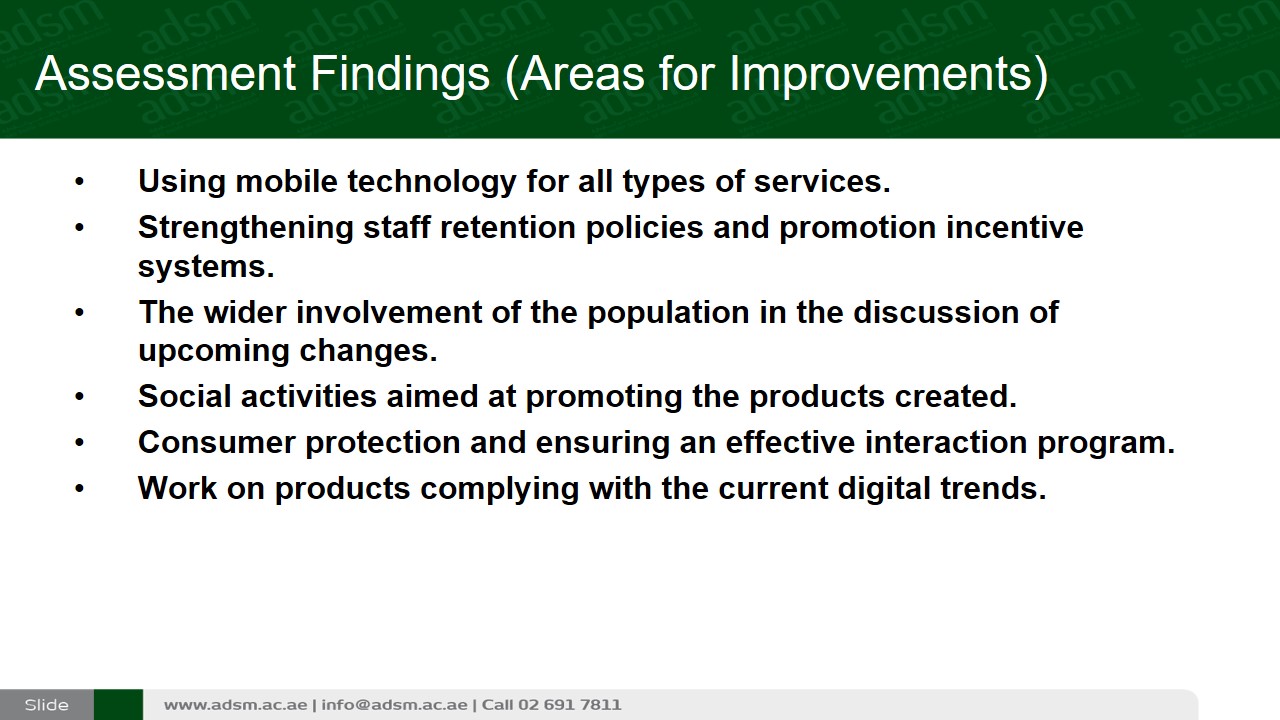
Assessment Findings (Score)
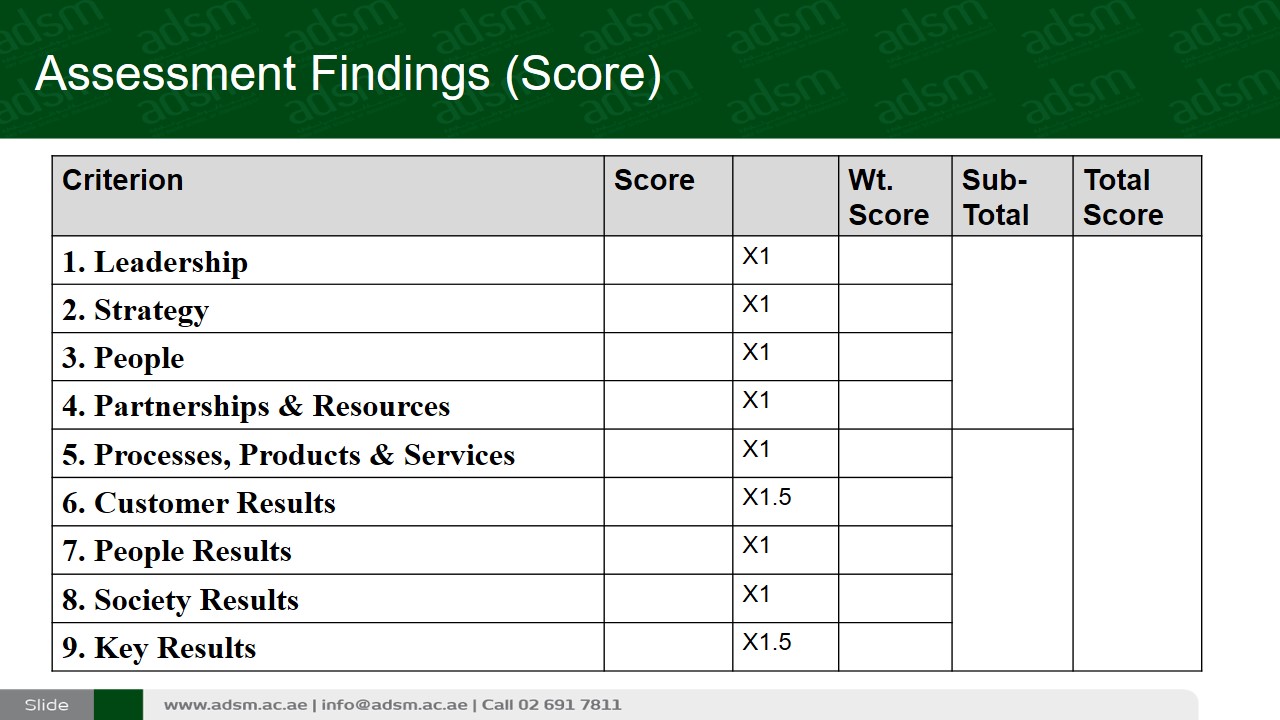
Assessment Findings (Learning)
- Continuous work on innovations implies introducing new strategic solutions (“Guideline,” 2017).
- Evaluating productivity allows making conclusions regarding the effectiveness of specific policies.
- The influence of different stakeholders is significant, including both government boards and the public (Yaghi & Al-Jenaibi, 2017).
- The country’s development plan is based on introducing technologies in the field of telecommunications (“Guideline,” 2017).
- The engagement of the TRA’s management in interaction with the staff stimulates productivity.
- Development goals cannot contradict the national innovation plan.
Based on the analysis, it can be noted that TRA copes with the assigned tasks successfully enough, although some modes of operation may be revised a little. Compliance with the national development plans is a significant aspect of activity, which, in turn, implies the need to follow formally established standards. In general, the nature of individual TRA’s practices is effective, and possible adjustments may increase its productivity.
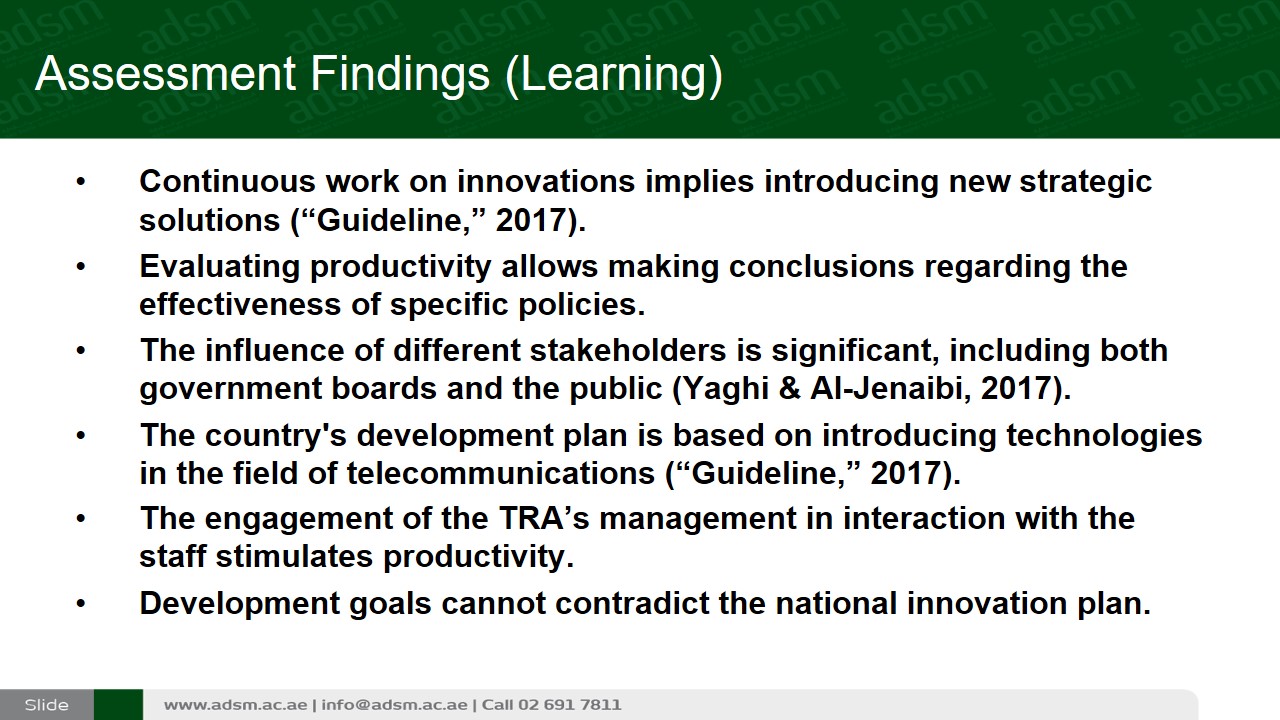
Recommendations
- The interaction between the management and staff should be advanced.
- Population involvement is to be more active.
- Analyzing market trends is a mandatory task.
- Using appropriate performance measurement techniques can improve productivity.
- The significance of this study lies in an opportunity to assess the prospects for the development of TRA.
- The assessment contributes to the formulation of relevant and effective growth strategies.
The continuous assessment of personnel work is a mandatory practice provided by the national quality standards of activity. Relevant recommendations proposed as a guideline for further development may have positive outcomes for both the organization and the population. The value of the analysis is that specific perspectives can be determined, and the formulation of certain growth strategies may be carried out on the basis of the findings and recommendations compiled during the research.
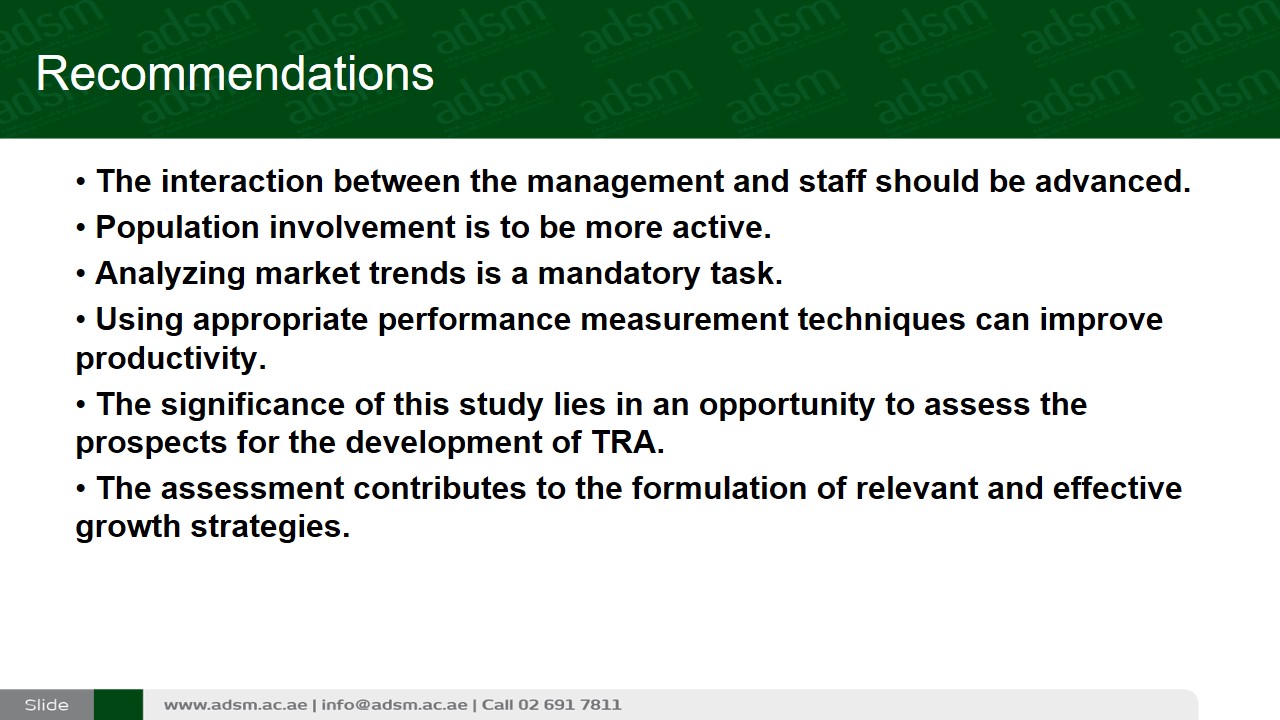
References
Alqudah, M. A. (2018). Consumer protection in mobile payments in the UAE: The current state of play, challenges and the way ahead. Information & CommunicationsTechnologyLaw, 27(2), 166-184.
ElSherif, H. M., Alomari, K. M., & Alkatheeri, A. S. A. A. O. (2016). Mobile government services satisfaction and usage analysis: UAE government smart services case study. InternationalJournalofComputerScienceandMobileComputing, 5(3), 291-302.
Guideline: Abu Dhabi excellence award in government performance fifth cycle – First version. (2017). Web.
Telecommunications Regulatory Authority. (2019). About TRA: Vision, mission & values. Web.
Yaghi, A., & Al-Jenaibi, B. (2017). Organizational readiness for e-governance: A study of public agencies in the United Arab Emirates. SouthAsianJournalofManagement, 24(1), 7-31.